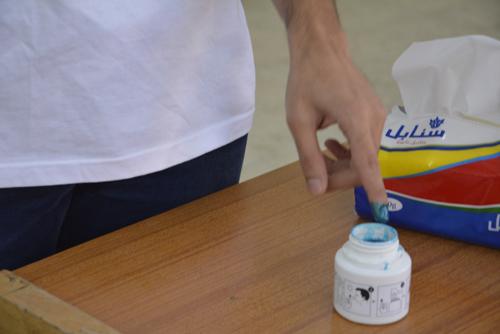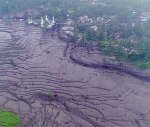You are here
NCHR ‘baffled’ by alleged vote tampering in Central Badia
By Laila Azzeh - Apr 19,2017 - Last updated at Apr 19,2017

National Centre for Human Rights Chief Commissioner Mousa Breizat speaks during a press conference in Amman on Wednesday (Photo by Sahem Rababaa)
AMMAN – Nearly seven months after the 2016 parliamentary elections, the National Centre for Human Rights (NCHR) is “still baffled” about the circumstances that led to alleged tampering with several ballot boxes in the Central Badia.
In line with its mandate as an advocate for improving democracy and the status of human rights in Jordan, while monitoring infringements on public freedoms, the centre took it upon itself to investigate the alleged occurrence, that include allegations of the theft and sabotage of ballot boxes.
“We hereby acknowledge that we did not manage to fulfil our job and uncover exactly what happened in the Central Badia that day… we have spent a long time trying to contact the concerned officials and authorities in that respective constituency, as well as what we believed were reliable witnesses. However, the vast majority of them declined to give us any details about their roles, and thus explain what happened with these boxes,” said NCHR Chief Commissioner Mousa Breizat.
He made his remarks at a press conference to announce the outcomes of the NCHR’s report on the 18th parliamentary elections, which took place in September.
Breizat underlined that the “concerned authorities did not cooperate with the centre’s requests to meet those who were in charge in the Central Badia constituency,” which hampered efforts to investigate the issue.
While stressing that the occurrence “does not mean in any way that the Independent Election Commission [IEC] is incapable of handling the elections,” he noted that it certainly means that there is a “problem in controlling their cadres”.
“The issue now is in the hands of the judiciary, which is capable of ruling on the matter with the utmost transparency,” said Breizat.
In the report, the NCHR cited a number of violations recorded during the elections, such as depriving Jordanian expatriates and those who changed their residence from voting, by not registering their new locations with the Civil Status and Passport Department and not clarifying the mechanisms for challenging these decisions.
The chief commissioner also noted the report’s mentioning of numerous shortcomings in the way the government dealt with the influence of political financing, which continued to be practised in the recent elections.
The report also outlined infringements related to the candidates’ campaigns, including direct and indirect political financing, which was apparent in the buying of votes, “a phenomenon that took place in all electoral constituencies”.
“However, not one of the funders or recipients reached the court,” noted Breizat, who added that the influence of money was also obvious in candidates’ “filling out” of candidates lists.
The recorded violations also included coltlecting IDs in return for in-kind support, such as heaters, food parcels or blankets, according to the report.
The “abuse” continued in the polling and vote counting stages, wt here several electoral district heads and members allegedly interfered with voters’ choices, the report said.
“In general, the election commission did not follow up on this issue, except in limited cases, although it constitutes a flagrant violation. The commission’s handling of these occurrences was not up to the required level, as it only excluded them without holding them responsible according to the law,” said the report.
Describing the overall 2016 election process as a “success”, Breizat noted that all countries witness violations on Election Day, but countries going through a process of “democratic transition”, such as Jordan, should be even more careful in order to maintain public confidence.
The NCHR report recommended addressing several issues, namely the influence of illegal financing, the role of the IEC in monitoring the candidates’ campaigns, the adoption of an electoral law that contributes to forming coalitions and ensuring that the commission’s cadres are independently and objectively hired.
Breizat explained the “late” release of the report by “reasons beyond the centre’s control”, although 95 per cent of the information it contained was ready to be announced on the eve of the Election Day, he said.
“The lack of information on the details that surrounded the Central Badia incident prompted us to delay issuing the report,” he concluded.
Related Articles
AMMAN — More than half of eligible voters cast their ballots in the by-elections of municipal and governorate councils in the Muwaqqar Distr
AMMAN — The national coalition to monitor the parliamentary elections on Tuesday notified the Independent Election Commission of violations
AMMAN — Independent Election Commission member Zuhair Abu Fares on Sunday said the commission has set a limit on campaign spending for all b













